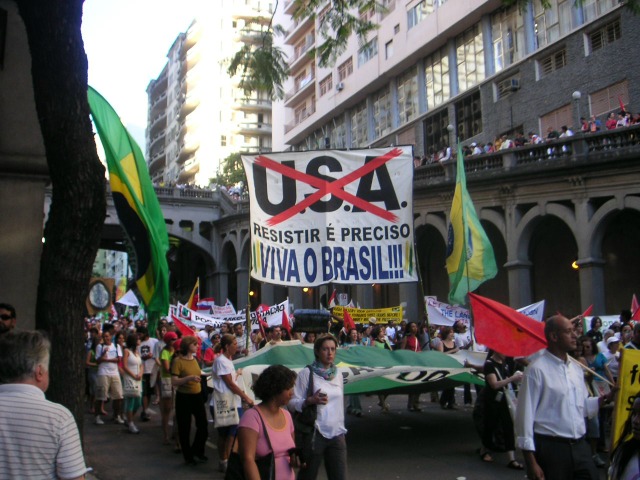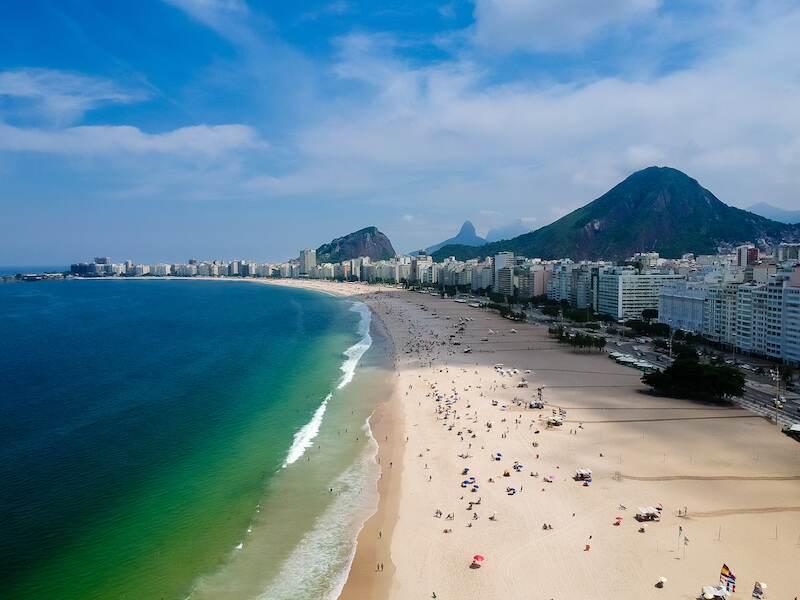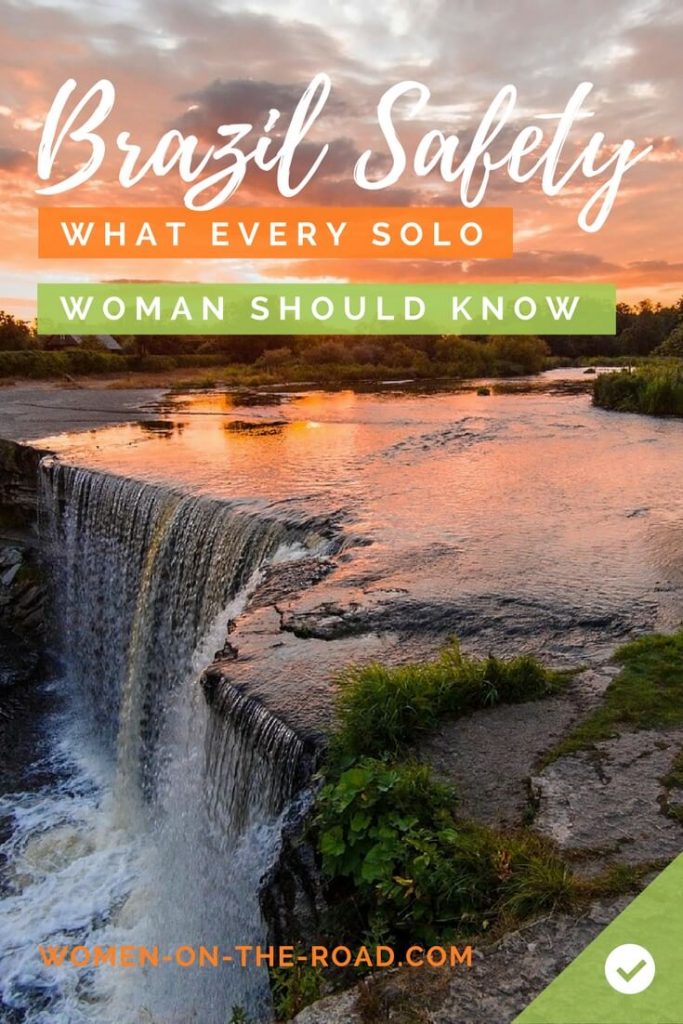Ed. Note: This article was written before the election of Jair Bolsonaro to Brazil’s presidency. Given his hard-line military background and rhetoric and his clear disdain of women, indigenous groups, homosexuals and other minorities, issues of safety may be affected.
11 June 2018 – The first thing you’ll notice about Brazil is its size and the amount of time it takes to travel around it – it’s much bigger than you think. The second thing you’ll notice is the diversity – of people, of landscapes, a country where no two states and no two families look the same.

Looking around Brazil you’ll find blonds with blue eyes, indigenous tribes from the Amazon, and children as dark as any from Africa. In a quirk of DNA, some of these might belong to a single family.
The flip side of this diversity, unfortunately, is inequality, a society where class distinctions are strong, where rich and poor live within sight of one another, the favelas of the destitute overlooking the luxurious highrises of the wealthy. This inequality is often covered up by the exuberance and joie de vivre demonstrated by most Brazilians.

WOMEN’S SAFETY IN BRAZIL
ZIKA warning: Brazil has been struck hard by the Zika virus. Most women should take sensible precautions to avoid mosquito bites but if you are pregnant, stay away. Here’s what the CDC has to say.
Safety is one of the bigger issues for women in Brazil so let’s get that one out of the way first.
Let me preface a less-than-rosy picture by saying that during my six-month stay in Brazil some years ago the closest I came to hassle was when I lost my guide in the Brazilian Amazon and thought I’d never find my way out of the rainforest.
To make sure things hadn’t changed too much I checked with my friend Georgiana Braga-Orillard, who for years ran the United Nations AIDS programme in Brazil and spent much of her time traveling across her country, and made sure I included her input.
First, the bad. There is plenty of violent crime in Brazil, like rape (much of it unreported); in Brazil a woman is assaulted every 15 seconds and the country ranks among the top ten for the highest rate of violence against women worldwide. The UK Daily Mail has named Brazil the #2 worst country for women to visit, second only to India.
But there is another side to this story, one that gets far less press because it isn’t as newsworthy – especially when it comes to Rio de Janeiro, the country’s top destination.
My friends Sarah and Yvonne who run the website Now in Rio have lived in Rio for the last five years and have first-hand experience there as solo women expats.
According to them, Rio de Janeiro safety is an issue, yet it’s not as bad if you stick to well-trodden areas, and there’s no reason you can’t enjoy a wonderful Brazilian holiday. It is a wonderful city of stark contrasts – rainforests teeming with wildlife and golden beaches with a bustling urban life, and most visitors leave with unforgettable memories. These safety tips apply to Brazil generally along with some specific ones for Rio.
- Neighbourhoods: The safest areas are the most touristic ones such as Copacabana, Ipanema, Leblon, Botafogo, Urca, and Humaitá. Centro is perfectly safe during the day but should be avoided late at night – it’s a major business hub so it’s quieter after 8pm with little to see. Lapa is near Centro and is a popular nightlife spot to party ‘til dawn. However, pickpocketing occurs so it’s best to stick to crowded places and take an Uber back home. Make sure your Uber picks you up as close to your venue as possible. Also, if you’re unaccompanied stay out of favelas, the urban slums that ring the largest of Brazilian cities. The exceptions are Vidigal which is totally “pacified” (government term), and Rocinha, which is fine if you take a guided tour (see this article for insight on slum tourism).
- Your belongings: Leave your fancy jewelry or valuables at home. Take your phone out for a few photos but make sure you put it back in your purse after. Don’t walk around with an expensive camera around your neck as it makes you an attractive target for theft. When on a bus, sit on the seat away from the window – it’s not unheard of for thieves to reach in through the windows and grab passengers’ valuables. Take care of your purse in crowded areas and keep it on your lap when you eat in restaurants.
- Getting around: As a solo women, it’s best to get around by subway or Uber, the latter especially at night. It is not a good idea to walk alone at night or you’ll risk being robbed.
- Male attention: Women often get catcalled in Brazil. Don’t be too alarmed or surprised by this behavior – it’s considered normal here. That doesn’t mean you have to accept it. Most women take it in their stride and ignore it, but others will retaliate and reply sharply. It rarely goes beyond name-calling, such as bonita (pretty), linda (beautiful), or gostosa (hot). Most times light flirtation is as far as it gets. Brazilian men tend to be pretty laid back and it’s quite rare for the hassle to turn violent. You’ll also avoid the overt approaches common in other countries – the pinching or efforts to touch you. That would be quite unusual in Brazil.
- Beaches: The beaches in Rio are one of the city’s most exciting characteristics. Just be careful not to stroll around the beach at night and don’t leave your belongings unattended.
- Hiking: There were recently a number of violent robberies on the hike going up Corcovado to the Christ the Redeemer. This trail would be best avoided – take the train or van to the top to see the iconic monument. No issues have been reported on other hikes in Rio – such as Morro da Urca and Dois Irmãos – have had no reported issues and should definitely be checked out.
- Enjoy: Most of all – enjoy your trip. Rio is a one-of-a-kind city that is welcoming, friendly, and heaps of fun.
The Splurge: Once-in-a-lifetime Brazil experiences
- Take a cooking class in Rio
- Discover São Paulo’s street art with a private tour
- Uncover the secrets of Salvador with an anthropological tour
A FEW MORE TRAVEL SAFETY TIPS FOR BRAZIL
- Keep an eye out for the occasional political demonstration and if you see one, head the other way; the police’s occasional heavy-handedness means this isn’t where you should be practising your political solidarity
- As a tropical country you’ll find the usual insects, parasites and other creepy things – make sure your vaccinations are up to date and that you take the proper precautions (like sleeping under a mosquito tent near water and in the rainforest)
- Tap water isn’t always safe so ask if they have a filter, which is perfectly safe, or stick to bottled water
- Beware the strong ocean currents; while Brazil has a huge beach scene, the ocean isn’t always safe and has strong riptides. I once spent two weeks in Recife unable to enter the water once because of warnings.
- And – this is the oddest thing – exploding manhole covers in Rio. Yes, really.
So yes. Be cautious, be aware of your surroundings and of the culture, and then go out and have a great time!

GETTING AROUND BRAZIL
Now that we’ve dealt with safety let’s not forget Brazil is one of the most beautiful countries on earth.
Brazil is certainly not the cheapest country in Latin America, nor is it the most expensive. Food on the other hand is quite inexpensive and depending on your budget you should be able to eat out to your heart’s content. There are an increasing number of ‘kilo restaurants’ where you pay by the weight, worth a try.
I got around this gigantic country in two ways.
First, and this isn’t for the faint of heart, I traveled by bus, mostly on conventional buses but there are upmarket luxury buses that are far more comfortable. This site will give you an idea of prices and help you book. Remember Brazil is huge – and you might be on the bus a long time. I would recommend this for shorter journeys.
For longer journeys I’d fly because when you compare long-distance bus costs with airlines, there might not be a huge price difference. I used an airpass for the longer travel legs. Off-season tickets can be quite inexpensive – you can easily find a $50 return ticket between Rio and Salvador de Bahia. The same ticket can cost you $1000 during peak season. Also check out Decolar or Submarino – but you will need help from a Portuguese-speaking friend.
In cities I tend to take taxis where possible – official taxis: make sure they display their taxi card and information somewhere visible. Although they’re relatively inexpensive make sure you agree the price before getting in. Taxi apps are more and more common and can give you added safety, as you will have all the driver’s info beforehand. Easy Taxi and Uber are widely used in big cities. In Rio the subway has women-only cars, but only during rush hour. Still…
If you’re driving on your own, beware of carjackings (especially at night, at intersections, if caught in traffic). They are not frequent but they do happen and a woman on her own would be an appetizing target. Try not to get lost because a dangerous neighborhood might sit right next to a safe one – and you might not know. Driving standards aren’t the highest (although laws, for example on drinking and driving, are very tough) so a significant amount of caution is required.
A FEW BRAZILIAN SOCIAL GRACES
Packing for Brazil shouldn’t be too complicated: dress up. Brazilian women tend to be elegant and even showy, for the tiniest occasion. Don’t worry about conservatism along the coast – you can show skin, wear a string bikini and a baring tank top if that’s your wish. In the interior, dress is more restrained.

This is a tropical climate and summers can get incredibly hot, so don’t wear synthetics. I always found linen did the job in Brazil, elegant yet cool.
No trip to Brazil is complete without a visit to its amazing natural environment – the Pantanal or the Amazon, at the very least, and this will require good hiking shoes, lightweight, and preferably as waterproof as you can find them.
As is the case in most European countries or countries with a sizeable European population, people kiss in Brazil, usually once on each cheek. That can vary but follow a Brazilian’s lead and you’ll get it right. You’ll be expected to kiss women you know when you see them, but men too. Brazilians are quite touchy-feely so if you value your personal space be forewarned: you’ll be hugged and squeezed and gently taken by the shoulder and your new friends will probably stand much closer to you than you expect.

A few more random facts: You cannot smoke in public. Prostitution is legal. Brazil is extremely gay-friendly. English speakers aren’t that easy to find.
And one small piece of social advice: if you agree with something, please don’t use the OK sign. Give a thumbs up instead. Or you’ll be making a very rude gesture.
WHAT TO BUY IN BRAZIL
Handicrafts. Jewelry, leather sandals, a hammock (from Fortaleza, its birthplace), things made from fruit, cachaça (alcohol made from sugar cane, the key ingredient in your caipirinha). If you’re in Bahia, head to the Mercado Model, South America’s largest handicraft market. Or any market. They’re always fun and full of food.
And my favorite: art. Brazilian artists are phenomenal and if this is something you like, then you’ll be in paradise in Brazil.

OFFBEAT THINGS TO DO DURING YOUR BRAZIL VACATION
You’ll find most of your travel needs met by any one of the popular travel guidebook series but here are a few suggestions that I’ve either tried myself or would love to during my next visit:
- The Fernando de Noronha archipelago – seabirds, whales, sea turtles and a UNESCO World Heritage site
- If you love wildlife, a visit to the Pantanal, possibly the most amazing wetland in the world
- The waterfalls at Iguaçu, on the border with Argentina (where you’ll get a better view)
- Visit the capital, Brasilia. It’s not your typical city but you’re in for a treat if you like Le Corbusier architecture.
In some countries, you can coast in holiday mode, thinking only of what to do next. Brazil isn’t like that. It has everything you’d want in a holiday but it’s a complex country with problems that haven’t been resolved yet, a country in which to keep your wits about you. While I love staying in off the beaten path, this is one country in which I try to stay in a hotel where I can (for the cheapest prices, use booking.com to compare prices of hotels in Rio de Janeiro or across Brazil).

— Originally published on 07 July 2015
Please don’t forget your travel insurance! Women on the Road recommends World Nomads if you’re under 66 (70 in some countries). If that birthday has come and gone, click here for travel insurance recommendations that cover you at any age.
PIN THESE PICTURES AND SAVE FOR LATER!



